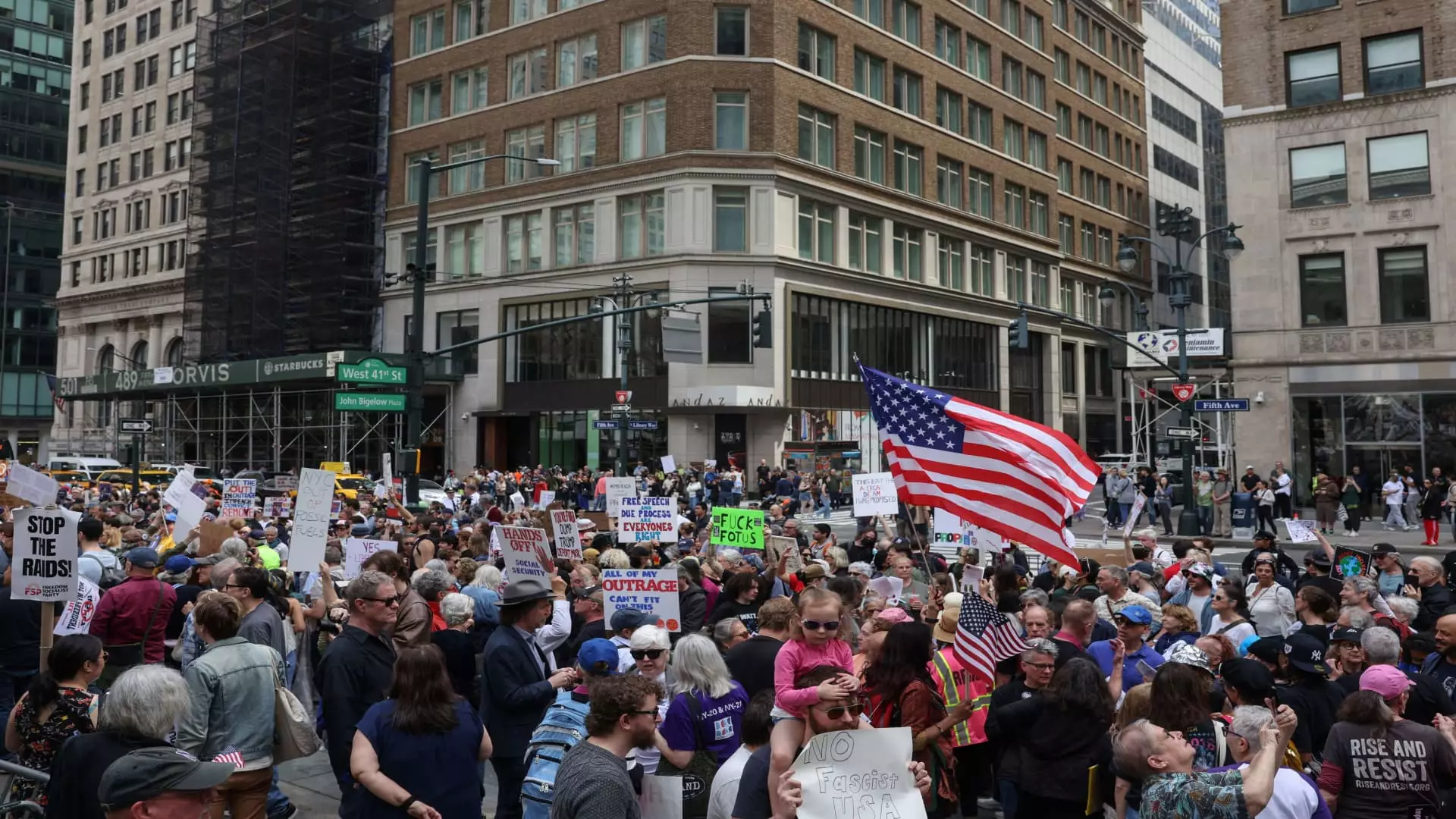In recent political turmoil, pockets of resistance have emerged across the United States, echoing a commitment to uphold democratic values threatened by the current administration. On a notable Saturday, citizens rallied in various cities, from the historic heartlands to bustling urban centers, unified by an urgent need to express their dissent against perceived autocratic tendencies. This grassroots uprising signals a pivotal moment where individuals from diverse backgrounds converge in peaceful demonstration, creating a vital counter-narrative to the status quo.
Veterans of many battles in the struggle for liberties and rights have emerged from the shadows, reminding us that the consequences of political apathy are profound. Thomas Bassford, a spirited 80-year-old veteran of activism, traveled three hours from Maine to participate in the reenactment of the Battles of Lexington and Concord, a profound historical benchmark in America’s fight for independence. His mission? To instill in the younger generation the critical understanding that the fight for freedom remains as relevant today as it was over two centuries ago. In his own words, “This is a very perilous time in America for liberty,” a reminder that complacency could spell disaster in the face of tyranny.
Beyond Protests: A Multi-Faceted Approach to Activism
The protests showcased a mosaic of actions reflecting a profound discontent with the authoritarian style of governance. Alongside fervent vocal demonstrations, innovative grassroots initiatives flourished, including community-service projects ranging from food drives to educational teach-ins. The variety of methods showcased an understanding that political resistance is multifaceted—instead of relegating activism to marches alone, advocates are attempting to uplift their communities while also standing firmly against perceived government encroachments.
By conducting food drives and volunteering, activists like Melinda Charles remind us that the structural challenges posed by policies can have tangible effects at the local level. This compassionate approach looks at not just criticizing systemic failures but responding to the needs of vulnerable populations, particularly as federal policies increasingly become punitive. It is this duality of action that epitomizes the modern resistance movement—not merely opposition, but a commitment to alternative solutions that elevate humanity in the face of oppressive systems.
The Dark Shadow of Authoritarianism
In a rallying cry, those who took to the streets raised powerful slogans against what many consider a burgeoning “police state” under Donald Trump. Bob Fasick articulated fears surrounding the crippling of essential government programs, and in the shadows, a more sinister agenda appears to be brewing. The dismantling of Social Security and other federal safety nets raises alarms about the sustainability of democracy itself—where the vulnerable can become casualties in a relentless march toward an unrecognizable political landscape.
The marked rise in harsh immigration policies and deportation rates highlights the stark reality faced by many under current regimes. This uncompromising approach signals a deeper ideological battle that touches upon the moral fabric of American identity, challenging the long-held narrative of inclusion and compassion. As evidenced by protesters’ chants of “No fear, no hate, no ICE in our state,” the call for a reassertion of humane treatment and rights transcends simple political grievance; it speaks to an ethical crisis that beckons urgency.
The Fight for Democracy Continues
The juxtaposition of peaceful demonstrations against the backdrop of increasing governmental authority illustrates a tension that defines modern America. As George Bryant boldly proclaimed, the Trump administration’s interactions with the judicial system pose profound questions regarding checks and balances—vital components of a functional democracy. When the executive branch seeks to consolidate power circumventing judicial oversight, citizens must confront the uncomfortable truth of their precarious situation.
This moment in history challenges each citizen to reflect on their responsibilities. Activism today is about much more than protesting; it’s about recognizing how every action, no matter how small, contributes to the collective pursuit of justice and equality. As individuals navigate these complex landscapes, they honor the sacrifices of those past by striving for a society that values liberty, inclusivity, and checks on power. In the face of threats to democracy, the vigilant voices of dissent will continue to resonate, ensuring that the fight for democratic values persists unabated.

Leave a Reply